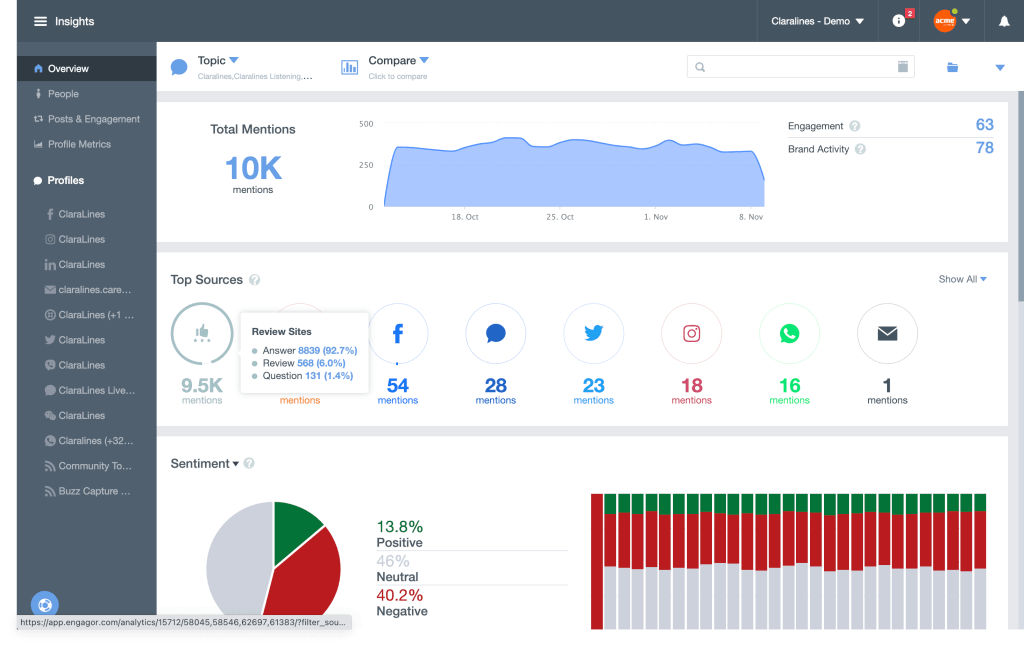
As a lawyer, you are compensated for bridging the gap between your client and the court of justice. You must possess excellent communication skills. When it comes to social media marketing for law firms, though, are you as successful?
It’s simple to ignore social media’s immense influence when considering how to market your legal company. Continually sending tweets, likes, and shares—not to mention tracking engagement—can initially seem like an excessive amount of work. Due to this, many lawyers avoid social media altogether.
We did the homework for you in this extensive guide to social media for law companies. We’ll cover everything you need to know to be successful with social media marketing for law firms.
Benefits of Social Media For Lawyers
You can’t avoid social media for very long if you’re serious about marketing your business.
Some attorneys have persuaded themselves that they are either too busy or that social media marketing simply causes issues with client privacy or defamation cases.
That is not true. It’s among the top methods for attracting new clients. Let’s examine the benefits of social media.
1. Brand Authority and Trust
In the legal industry, brand recognition is essential. You develop a unique, recognizable brand when you frequently provide thought leadership, highlight your accomplishments, and offer insights into the culture of your company on social media. This consistent brand narrative positions you as an authority in your legal area and helps you get credibility.
2. Client Acquisition and Lead Generation
Potential customers are very likely to find you on social media.
It is clear that law firms that engage in social media marketing have benefited from their efforts by gaining new clients. Your business can use social media to grow naturally or through paid advertising if you have the appropriate approach. What would having additional clients entail for your legal practice?It provides customers with an additional well-liked method of finding your business outside Google Ads, organic search, referrals, or other marketing channels.
3. Community Building and Networking:
Beyond only engaging with clients, social media platforms give law firms a place to establish a professional network inside the legal community.
Making connections with other lawyers makes it easier to collaborate, exchange important legal resources, and receive possible referrals. Social media networking breaks down geographical barriers, giving law businesses the opportunity to reach a wider audience and make valuable contacts within the legal industry. For businesses looking to build a strong supportive professional network, this benefit is vital.
4. Cost Effective Marketing
When it comes to legal businesses, social media marketing is a more affordable option than traditional types of advertising. Reaching the most relevant audience with resources is made easy by the capacity to target particular demographics and interests.
This focused strategy makes the most of marketing initiatives, enabling even smaller legal practices with constrained resources to successfully compete in the digital sphere.
The affordability of social media marketing renders it a desirable choice for legal firms seeking to maximize their marketing tactics while adhering to financial limitations, so promoting greater parity in the extremely competitive legal industry.
5. Assists in Social Listening
Everything about your target audience that you’ve ever wanted to know but were afraid to ask is revealed by social listening. You or, more precisely, the applications you use engage in social listening when you search the web for everything people are saying about you online.
This includes comments and posts on social media platforms, reviews on websites and forums, and more. It implies that you can actively search for and respond to posts as well as monitor what others are saying about your rivals.
There are countless applications for social listening and it would for sure help lawyers and law firms.
Social Media Marketing For Lawyers
You now understand how important social media is for law firms. But you must use strategy in your approach if you want to benefit from it.
The following points will assist you in receiving the return on investment you are entitled to.
1. Understanding The Rules and Regulations
Before creating an account for yourself or your law business on social media, make sure you are aware of the laws and obligations that apply to lawyers in your country.
Before you post or share anything, make sure you are aware of the compliance obligations and ethical guidelines outlined in the law society and bar rules. Many states forbid lawyers from referring to themselves as experts or specialists.

2. Social Media Policy
It’s a good idea for both lawyers and law firms to come up with a social media policy that everyone abides by.
Although lawyers and law firms frequently operate personal social media pages, it’s crucial that they maintain consistency when speaking on behalf of the company on professional pages.
This will not only help your employees understand what is expected of them, but it will also safeguard your reputation and help you avoid some potential issues with having a social media presence.

3. Best Social Media Platform For Lawyers & Legal Firms
Before you commit the time to establishing a profile, it is very important to be familiar with the social media platforms that works best for lawyers, According to renext Facebook, LinkedIn and Instagram works best for lawyers & law firms.
Certain networks might be more appropriate for you or your company than others, based on things like:
- Target audience & Personas
- The kind of content & its format you want to post
- Your area of expertise
1. Facebook
The site has advanced advertising tools that might aid in bringing in new clients for lawyers and law firms. Based on their habits, hobbies, and even location, law firms can design unique advertising campaigns that specifically target those who could require legal assistance.
Facebook is a great tool for more than simply attracting new clients; it also works well for keeping in touch with them by sharing updates and engaging in conversation.

2. LinkedIn
If a prospective client needs to learn more about you, they’ll conduct a Google search and most likely end up on your LinkedIn profile. Therefore, the social network is a great platform for immediately establishing reputation and authority. Yes, you may use LinkedIn marketing to get organic leads.
Before using LinkedIn, ask yourself these questions:-
- Who are the viewers and participants in his content?
- Which articles were producing results?
- From where do they belong?
- What do they do for a living?

3. Instagram
With over 2.4 billion users, Instagram is Meta’s second-most popular social networking platform behind Facebook. While Instagram is generally used as a platform for sharing eye-catching photographs, it also gives attorneys the chance to interact with potential clients in a more intimate way.
Lawyers can share behind-the-scenes insights of their practice with clients using tools like Reels and Stories, which promotes authenticity and trust.
Additionally, incorporating hashtags can significantly improve the exposure of messages. This helps in potentially reaching those in need of legal assistance.

4. Be Goal Oriented
A successful digital marketing strategy can aid businesses in achieving a number of objectives.
Companies can increase brand awareness and make their presence more noticeable to potential clients by utilising internet channels and methods.
In addition to increasing website traffic, this enhanced visibility also opens up chances for lead generation. Furthermore, by interacting with them through tailored content and promotions, a successful digital marketing strategy can concentrate on keeping hold of current clients.
In the end, it can also pave the way for attracting new customers who are attracted to the brand’s online presence and the value it offers. Because of this, companies who prioritise digital marketing can profit from an all-encompassing strategy that boosts their brand, website traffic, customer retention, lead creation, and client acquisition all at once.
4. Target Audience & Persona
Understanding your audience is essential to the success of your social media marketing campaigns. By doing so, you may better target your messaging, provide pertinent content, and start advertising campaigns.
Moreover, analyse your competitors’ material: Locate other law firms in your field of practice that are active on social media and study the type of content that attracts a lot of engagement. The goal is to attempt to repeat their achievement. So, write down the kinds of posts you want to write.
5. Choose Social media Platform
Though it’s enticing, it wouldn’t be a good idea to start posting on all of the social media sites. Rather, only focus and put your energy on platforms which works best for lawyers and which your target audience use.
Start with a few platforms and expand from there. As we have already mentioned Facebook, LinkedIn and Instagram works best for lawyers and law firms.
If you open too many accounts, you’ll probably get overwhelmed, produce fewer insightful content on each site, and never become an expert in any. After you master these few accounts, than you should think about expanding your reach to Twitter, Instagram, and possibly even YouTube or TikTok.

6. Work on Your Content
Make a plan for the information you’ll publish on your social media pages.
Consider what your target audience expects as you plan your strategy, regardless of whether you want to create new content to post as part of your marketing plan, share old content, or concentrate on connecting with people in comments.
The most important thing is that you consistently post interesting and useful material.
It is better to use both original stuff and reposting other people’s valuable content. It doesn’t matter if you do that with video or photographs; what matters is that you’re posting.


7. Engage With Your Followers
Participate in the discussion in the comments section and reply to any private messages you get.Consider scheduling a regular live streaming session, depending on your availability, to provide legal advice to your prospects. Also, make surveys on topics that are important to your audience.
You can slo add a call to action to the majority of your posts. Ask your readers to visit your website, share your post with a friend (to whom it is relevant), leave comments on your article, or even get in touch with you for a free consultation.
8. Make a Content Calendar
The most effective social media marketers build out a thorough content calendar months in advance.
You schedule what and when to post on your social media pages using a content calendar. It provides you with an organised plan of what you want to accomplish over the following several months. These things help in preventing you from being forced to search for inspiration at the last minute.
Planning ahead for your postings also offers you time to double-check everything in terms of ethics.

9. Analytics & Metrics
It’s time to evaluate your content after your strategy has been in place for a few months. Analyse the measurements you established for your goals.
Try to watch these things:-
- The number of website visitors you received.
- The growth rate of your audience as measured by the number of likes and followers.
- The kind of material that most resonates with your audience
- The quantity of free consultations or email signups brought forth by social media.
If you’re using numerous social media channels, analyse each one’s performance by providing an answer to each of the questions above. You can compare your audience growth to that of your social media rivals by watching and analysing them.
Repeat your plan using the learnings using social media marketing analytics. Think about incorporating platforms, eliminating platforms, or even including social media advertising.

Wrapping Up
Social media marketing is obviously essential for lawyers and law firms. It’s a potent tool for developing your brand, attracting new clients, and standing out in the legal industry.
Yes, at first it may seem like a lot of work, but the rewards are worthwhile. You establish yourself as a respected authority in your industry when you continuously display your knowledge and promote your company’s culture on social media. This draws clients and increases your company’s appeal to potential team members.
To maximise it, you must adhere to the regulations, establish a social media policy, establish clear goals, comprehend your audience and competitors, and begin small. Pay attention to social media sites like Facebook, LinkedIn, and Instagram that fit your content and audience. Post frequently, interact with your fans, and monitor your advancement using stats.
Ultimately, social media may help lawyers and law firms interact with clients, establish their expertise, and succeed in the digital age. Therefore, don’t pass up this chance!





